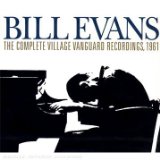Usually, I try to use album releases and recording sessions as the basis for these features. But something struck we when I realized that September 15 was the anniversary of the death of jazz pianist Bill Evans. When he died in 1980, he was barely 51. That’s what struck me. With my birthday this week, I am two years old than Evans was when he died. It brings home how young he was, at least from my perspective.
 Like many others, I place Evans in my pantheon of jazz pianists. He’s also one of the reasons I dislike use of the term “smooth jazz” to describe a relatively recent subgenre of jazz. To me, Evans is the epitome of what I consider smooth jazz, smooth as in silky and luminous. Many, including Evans himself, described the phrasings he used as like singing.
Like many others, I place Evans in my pantheon of jazz pianists. He’s also one of the reasons I dislike use of the term “smooth jazz” to describe a relatively recent subgenre of jazz. To me, Evans is the epitome of what I consider smooth jazz, smooth as in silky and luminous. Many, including Evans himself, described the phrasings he used as like singing.
Even among those who aren’t true jazz fans, Evans is known for his contributions to Miles Davis’s Kind of Blue, for which, among other things, he co-wrote the classic “Blue In Green.” While his performance on that album is stunning, anyone who cares about music needs to listen to the trios Evans formed, particularly with bassist Scott LaFaro and drummer Paul Motian. That trio released just four albums before LaFaro’s death in a car accident in 1961.
Two of those albums — Sunday at the Village Vanguard and Waltz for Debby — were recorded live at the Village Vanguard in New York City on June 25. 1961. (LaFaro’s fatal car accident was 10 days later). Both are stunning and must haves for anyone who loves jazz. As far as I am concerned there is only one item better in the entire Evans catalog — The Complete Village Vanguard Recordings, 1961. Released in 2005, this box set contains all three performances that day in order. It is, in my mind, one of the best jazz box sets available and, as I’ve said before, “a slice of heaven in a box.”
I’m one of those who view this stretch as the high point of Evans’s career. He released numerous albums as a soloist or leader in the ensuing two decades but they seem inconsistent. Undoubtedly, that had a lot to do with his drug problems. Evans became a full-blown heroin addict during his time with the Miles Davis Sextet in 1958 and 1959. Although he eventually kicked heroin, by the 1970s he was caught up in cocaine. In fact, in Peter Pettinger’s excellent biography, Bill Evans: How My Heart Sings, a close friend called Evans’s death “the longest suicide in history.”
Still, when his last gigs, performed from two weeks to a week before his death, were released in an 8-CD set in 2000, the release garnered rave reviews. My fellow Blogcritic Ted Gioia, who happened to see Evans perform during those last gigs, summed it up quite well a couple months ago: “You hear Evans’s harmonic colors and conception everywhere these days — and not just in the jazz world. In any attempt to gauge the impact of keyboardists from this era, only [Thelonious] Monk can rival Evans, and that only in the deepest inner sanctum of jazz.”
That, I think, is why the coincidence of the dates of Evans’s death and my birthday really struck me this year. The thought isn’t comparing how much he accomplished compared to me, it is wondering what more he could have given us had he lived longer.
Especially, I want my work — and the trio’s if possible — to sing.
Bill Evans, quoted in Bill Evans: How My Heart Sings







